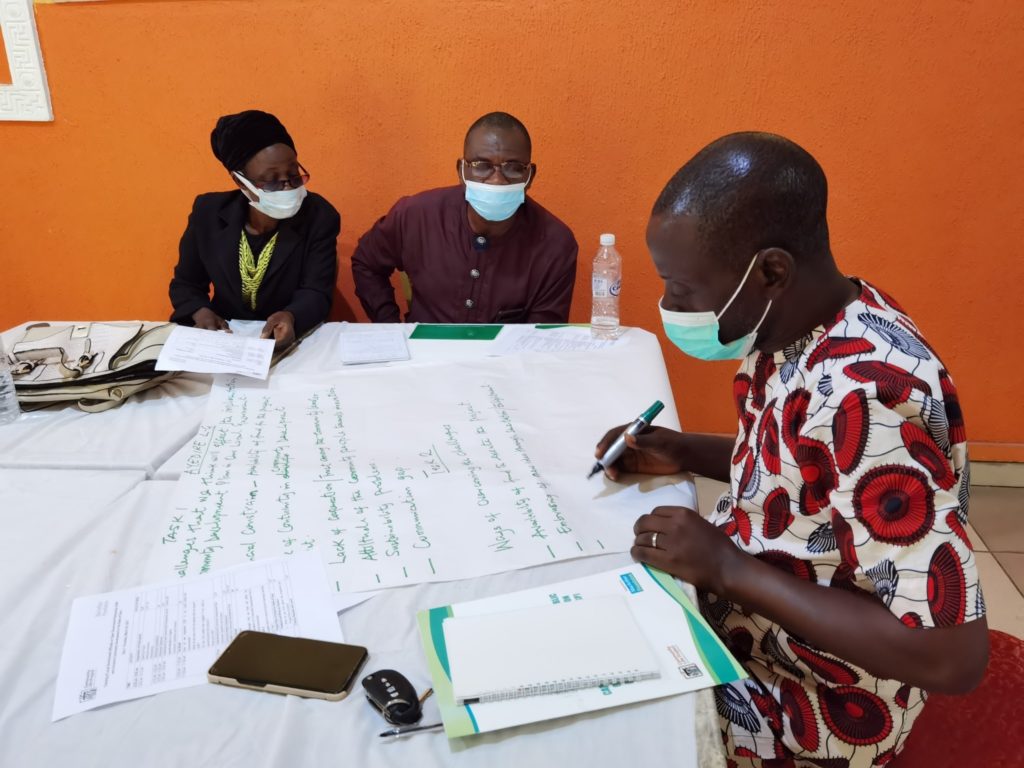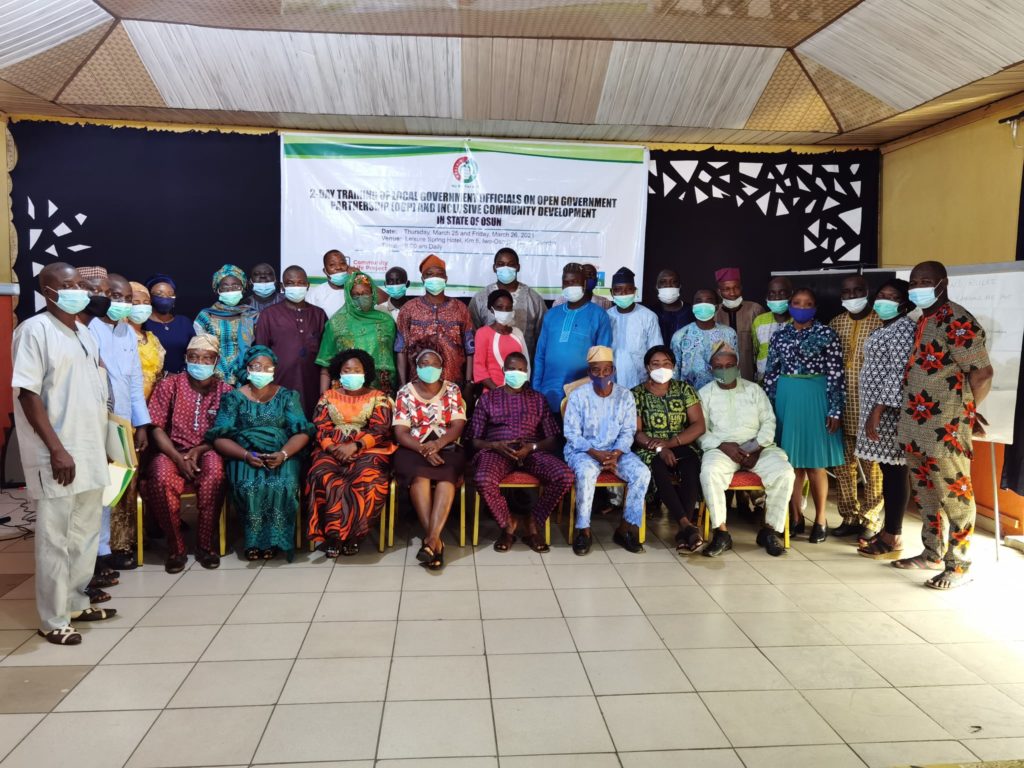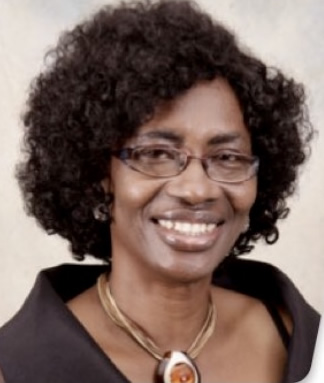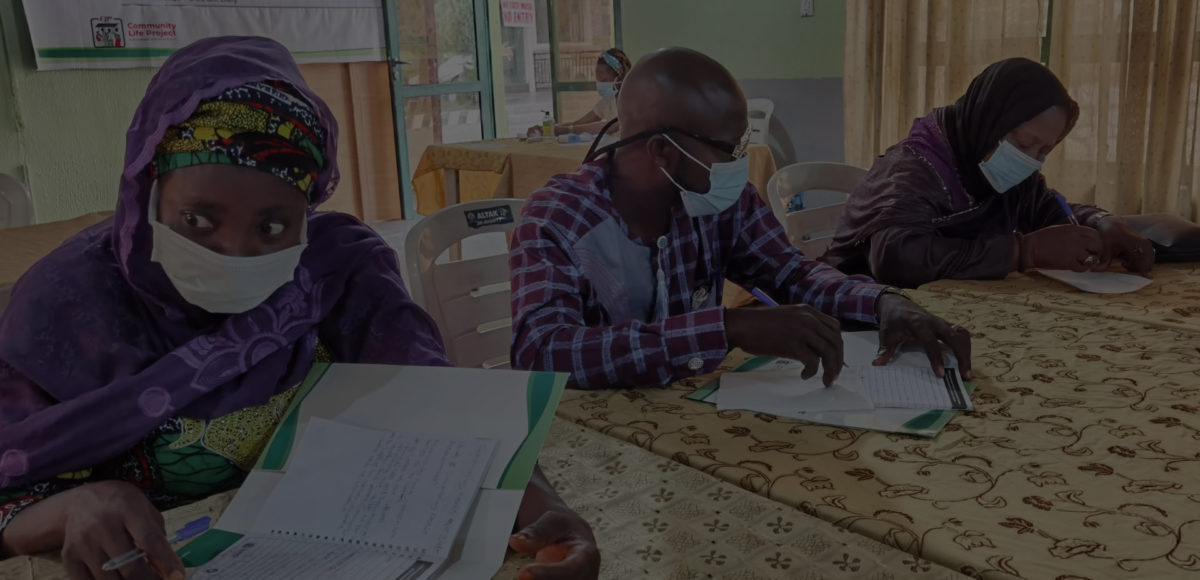Ngozi Iwere is the founder and executive director of Community Life Project and the coordinator of the Reclaim Naija, its grassroots platform. She speaks on the impact Reclaim Naija has made using technology on grassroots politics, elections and the challenges of Nigeria’s electoral process.
Background on Community Life Project and Reclaim Naija:
We started the Community Life Project in 1992, as a result of the marginalisation of poor, disadvantaged communities who were outside the mainstream communication channels. At the time, HIV/AIDS was already a pandemic, but there was a lot of silence surrounding it in Nigeria. There was no response from the government or even from the civil society. Just a few non-governmental organisations were doing things targeting long distance truck drivers. So, we felt that HIV/AIDS was a population-based pandemic, given the nature of the virus, and that everyone needed to have that information, that the health system needed to provide a response for it. So, we decided to target and get people who are outside mainstream communication channels, who are disadvantaged and are marginalized, to take HIV/AIDS preventive information and education to them, and also to try and see how we can link them to services.
So, the Community life project is all about inclusion, it’s all about trying to end inequality in access to services, decision-making processes, and inequality in expression of their voice. Over the first ten years, we worked on about eighty different issues, all of concern to grassroots people.
We developed a model of grassroots-inclusive development, participatory development, and governance in our community where we started in Isolo, and then we spread and scaled it to replicate in other parts of Lagos. Eventually we replicated it in the six geo-political zones. We then decided it was time to go big nationwide and use that model we have built to mobilize grassroot communities to do something about cleaning up the electoral system, about promoting electoral integrity, and that was how we created the Reclaim Naija Movement towards the 2011 elections.
“the Community life project is all about inclusion, it’s all about trying to end inequality in access to services, decision-making processes, and inequality in expression of their voice.”
On the nature of their model of grassroots inclusive development:
The model is very simple. It is not about engaging individuals, although individuals are part and parcel of what we do. It’s about harnessing the social capital we have in society. The existing social structures, the associational life of our people; they are all organised. They all have their associations that they themselves have created, are running and funding it so, they don’t need money from people. The mechanics, vulcanizers, car battery chargers, carpenters, welders, building material suppliers, they are all organised. So, all the model entails is going to partner with them around any issue that we think is important.
 Reasons for establishing Reclaim Naija:
Reasons for establishing Reclaim Naija:
In 2010, we decided to create a movement, Reclaim Naija, which aims to reclaim the country from the politicians that have been misgoverning it. We decided to go into the political and governance space to influence things there. Our objective was simple: the elections had progressively worsened in terms of credibility from 1999. 2003 was worse than 1999, 2007 was worse than 2003, and so we said, okay since we had a head of INEC, Professor Attahiru Jega, who was a person from civil society, from the labour/ trade union movement, and somebody we knew to be credible, a committed patriot, we felt that was an opportunity to engage INEC since we also have experience in working with government agencies. We decided to team up with INEC. We wanted to reverse that trend of one election being worse than the other, and we knew that the key to achieving that is having a credible voters register which we didn’t have. And INEC had introduced technology which it wanted to use for voter registration.
On the use of Ushahidi Technology for citizen participation:
We pioneered bringing in technology on a scale to allow citizen participation and voice, in working with the electoral body to deliver a tangible outcome. For us, that first outcome was a credible register. We adapted the Ushahidi technology, which is an incident-reporting platform, and you crowdsource to report on that platform. We adapted the technology, developed it, built in voice telephony and linked it with our SMS services because the grassroot people we worked with didn’t have smartphones and they were not internet savvy. We used Ushahidi, the SMS-based solution and voice telephony, to make sure that we ended their exclusion and promoted inclusion in the digital space. What we did was to monitor voter registration. We had the Okada (motorcycle taxis) communities in our network take to the streets in 22 cities, getting people to go out and register, telling them that this time it was going to be different. When it was the grassroots people doing the outreach and speaking to their fellow grassroots people, that galvanized a lot of people to go and register. They were collating and sending reports to us about what was happening as they were registering, and that report was being fed to INEC, and INEC was using that to improve on what it was doing.
The other thing we wanted to achieve with Reclaim Naija, having done the voter registration, was to help INEC by sending incident reports from polling units where citizens were voting. INEC published our platform, Ushahidi and Reclaim reporting numbers, and gave it to the media and that was published too. So, more citizens than those within our network sent in reports and these reports were google-mapped and were on the platform. So, in the situation room in INEC, they have people looking at those maps, picking up where the incidents are and where they needed to troubleshoot. Having done that, the space was open for popular participation, and it’s now a culture and tradition that citizens can send tweets or anything about any incident they observed, phone calls to electoral officers and to INEC on election day. So, popular participation, we pioneered that and it’s taking hold, and now a culture that the people are participating on election day in administration and management along with the electoral body.
On Elections and Post-Election Activities:
We are also very active in the election Situation Room as one of the key people and we helped a lot in elections in 2015 in verifying incidents. If there were reports that came from different sources, not from us, about something going on, especially something serious, we were asked through our Reclaim platform. We had people everywhere on ground who could verify whether those incidents actually occurred in those places. Beyond elections, post elections, because we know that it’s one thing to have a voice in the voting and electoral process, but citizens also have to have voice in the governance process and governance decision making. So, post election, what we have been doing is civic education of people in our grassroot network. We have also been strategic. We are looking at the people having a voice in deciding where the resources go in their communities. So, the budget is for us a very strategic mechanism through which people can have a voice. It’s going to create a new culture within the government and how business is done. We are looking at participatory budgeting and since 2012, we’ve been working on participatory budgeting, and in many communities, we have citizens engage with government officials. We are also training them: the budget officers, the heads of department and the council managers; these are the civil servants.
“As the communities are trying to work with the government to address these issues, we notice the tension between the civil servants and the politicians – the elected officers. Sometimes the elected officers want to control the money and have their own agenda.”
 On organisational challenges in the course of advocacy:
On organisational challenges in the course of advocacy:
There are environmental challenges, talking about the political environment and climate. When it comes to election observing for instance, and incident reporting, there are places where it’s difficult for our people to do so because of the violence, the intimidation and the thuggery that happens within the system. We’ve also faced the challenge of our people not being able to support credible candidates they know in their communities that will do a good job. They know the people emerging as candidates because of the way primaries are run and the way candidates emerge. So, that is decided by godfathers or the moneybags. There is the frustration that candidates that grassroots people or the people in our movement would have preferred, are not able to emerge as candidates. There are those bottlenecks that have to do with the legal framework, the constitutional framework and of course the practices of the key political actors, the members of the political class themselves. Our response to that is to ensure that the voice of the grassroots people in our Reclaim Naija Movement is heard. We team up with other civil societies to put pressure and carry out advocacy at the national and sub-national levels. So that is one challenge we face and the way that we work.
The other thing that we have experienced, is that there is tension between the civil servants within government. Because we are trying to influence the budget-making culture, we find duplication of projects in communities because they are not matching the real needs of the communities. You find projects that are abandoned. There are frauds going on and inflated projects. As the communities are trying to work with the government to address these issues, we notice the tension between the civil servants and the politicians – the elected officers. Sometimes the elected officers want to control the money and have their own agenda. They want to steer services to their own communities or their localities and navigating that is one of the challenges that we face.
As an institution, one of the things we’ve not been able to see is the scale. We have the capacity to work all over the country and our work is not always at that scale because of the resources. Resources are not readily available. We’ve been able to cover all the 36 states and over 200 local governments with the Reclaim Naija popular participation in the electoral process because we had enough funding to carry that scale. But we’ve not been able to have that kind of funding to take our participatory budgeting work to that scale all over the country. I think this is one of the challenges that we are facing in the programmatic area.
“I think that the culture within political parties, that is internal party democracy, is one big headache, one big nut to crack.”
On major challenge in Nigeria’s electoral process:
We already know the major constraints that the electoral body faces, how to unbundle them and how to get the different stakeholders living up to their responsibilities. For instance, who is supposed to arrest, who is supposed to prosecute people who violate electoral laws; we still have challenges in that area. But I think that if we are talking about how to have the desired outcome from our electoral process, which is to have decent candidates who are going to put governance on their agenda, I think that the culture within political parties, that is internal party democracy, is one big headache, one big nut to crack. Also, one is not able to see how the reforms that we are making now, are really going to address that issue of lack of internal party democracy; the fact that people dictate what candidate will emerge and that meritorious candidates don’t get to emerge if they are not cronies of the big money bags or the godfathers within the political parties. I think if we took care of the lack of internal party democracy, then we can begin to see real positive outcomes in terms of who emerges as candidates and who eventually can win elections and assume elective offices.
The other thing is the vote trading on the part of the electorate. Tracing the evolution of vote trade, it used to be the politicians inducing the electorates. Now, we have situations where the electorate are by themselves making demands for money for their votes. They themselves are trading and selling their votes. I think that is one challenge to look at. The constitutional reforms over the years have evolved and I think a lot of progress has been made there but there are attitudinal barriers and practices that an entrenched culture undermines, not making it possible for the reforms we are making to bear the kind of fruits that we expect to see. So, these for me, are the challenges that I see.
“The State Independent Electoral Commissions are being appointed by the state governors and being told exactly what to do and being dictated to. I think that more civil society voices need to move into that space.”

Ngozi Iwere, Founder & Executive Director, Community Life Project and Coordinator of the Reclaim Naija
On the passage of the Electoral Bill, the role of election stakeholders and CSOs in promoting citizens political rights:
I think first we have to push that the Bill be signed into law, because the fact that it’s been sent to the Presidency, we had a precedent before, the bill might just sit there. How to get it signed is what we still need to push because it is only when it has been assented to that we can say we have the act. It’s also to popularize the content of the electoral reforms. We need to get that out to the electorate, to broaden the base of those who understand what is happening and what we can expect and anticipate in the forthcoming elections that we are going to have in 2023. Also, we need to get more popular participation in the staggered elections that we have in states that are going to have elections in between the general elections cycle. We are at the grassroots and the local government is really the level of government that makes more sense to the people in our movement and the communities we serve. I think that CSOs generally have paid so much attention to the national level. We need to pay more attention to the state level and to legislation around governance at the state and local government levels in terms of the relationship between state and local government and how you structure it. This is because the elections into the local governments are a complete sham. They are just laughable.
The State Independent Electoral Commissions are being appointed by the state governors and being told exactly what to do and being dictated to. I think that more civil society voices need to move into that space. We need to go and do some of the clean up work that we’ve done at the national level; do some of the advocacy for the reforms that we need. Either that the State Independent Electoral Commissions become independent and are empowered to deliver or that we have a different kind of arrangement in terms of how elections work. Some people advocate that INEC should conduct even the local government elections, but one begins to wonder if that’s even the best way to go if you’re talking about decentralisation. Do you want the centralised election at the federal level, coming again to organise municipal elections at the local government? So, these are all conversations we need to have and Reclaim Naija is going to be driving these conversations going forward because we have had some experiences that we have got working in that area. These experiences can inform us driving this kind of conversations and also trying to rally more societal participation in intervening at that level.
On shrinking civic space and outlook for CSOs:
I think that we have experience in this country in pushing back against repressive governments, and we have the experience of other countries also with repressive regimes. Yes, contexts might be different, but the principle is the same. The only thing for citizens to do is to organise themselves and pushback. So, a great deal of community organising is required. A great deal of collaborative work with those that are at the receiving end of the repression is required. The labour unions are key. I know there are issues of credibility with labour unions but they have a critical role to play in pushing back on the civic space. If we learn something from the past struggles that the country has had pushing back against the military, it is that youth organisations and movements are key. The student movement, the labour movement and of course the politicians at that time were part of that movement. What we learnt from EndSARS is that when there is a shutdown of economic activities in the country, the government tends to listen more than when citizens just come out and protest. This is because normally they will just disperse the protest and go but the government is forced to listen when it’s paying the price socio-economically. It used to be the labour movements that shut down the country, but the EndSARS protest was able to strategically do it in Lagos. So, what it shows is that all the civil society stakeholders and organisations we need to be as inclusive as possible. With EndSARS, it was seen as a youth thing. When another group is organising, it is seen as their thing. I think we need to close ranks and have demands that everybody can rally round because the society is so fragmented now; the ruling class has manipulated religion and ethnicity to an all time high as we’ve seen over the decades.
So, the social cohesion has been undermined greatly in the country. Social media is also allowing for a lot of misinformation to go around. So, we need to build social cohesion. We need to have those key demands that affect everybody in terms of violation of human rights and push back collectively across regions and religious divides against that attack. I think that some of what we are doing now, we need to do more of it- and that is to engage the judiciary even though there is impunity, even though the rule of law is undermined. We cannot but continue to push for that. Also, calling for justice for victims is important. I think that the recent panel of report into the EndSARS situation in Lagos has just shown what the possibilities are and that we should continue to push. We now have to push for accountability that all those indicted by the panel will face justice. I think we need to engage outside our country more sub-regionally and internationally to expose more human right violations in our country. We need to have a more pan-African outlook because the shrinking civic space is happening everywhere – beyond our shores. So, we really need to join forces with people. I think we are in a historical moment that was like pre-independence days, when our nationalists across borders and politicians decided that we are going to engage our colonialists and we are going to try to kick them out of Africa. I think that we need to do some of that and use some of those approaches. In other words, look at our history of struggle and replicate and build on the legacies we have. Then, we need to adopt new forms of struggle to meet these times and then use technology. I know we are using technology already, but I think we can leverage technology even more than we are doing now to push back on the civic space.
“I think that the recent panel of report into the EndSARS situation in Lagos has just shown what the possibilities are and that we should continue to push. We now have to push for accountability that all those indicted by the panel will face justice.”
Now the 2023 elections and the next elections, for me, is another opportunity that we need to leverage seriously to reverse this attack on the civic space as much as possible. We do need to re-think the role we’ve played in the electoral process so far. In these coming elections, are we going to stop at just observing elections and reporting and trying to collate results or are we going to take the leadership in driving a different kind of politics and in putting issues again because our politics are no longer issue based? Are we going to return to issue-based policies and take the candidates to task on the issue of what they are going to do about civil liberties in the country, and really ask the tough questions to influence the quality of candidates that emerge, or that the electorate will choose? I think it’s a combination of a number of things, but these are some of the things that from my end, I think civil society activists can do to reclaim the civic space.
Photo Credit: Community Life Project (Facebook)


